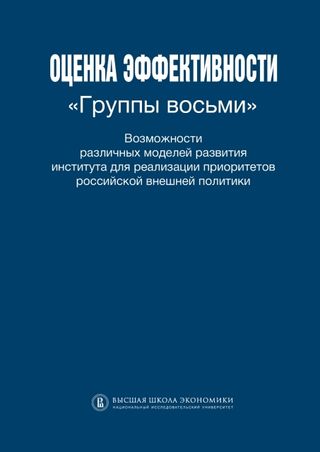?
Исполнение странами — членами «Группы восьми» обязательств, принятых по инициативе России на саммите в Санкт-Петербурге в 2006 году
.
Zaytsev Y. K.
In book

Vekshina A., Zaytsev Y. K., Lanshina T. М.: Издательский дом НИУ ВШЭ, 2012.
Bystritskiy A., Сайт дискуссионного клуба "Валдай" 2025
Есть распространённое мнение, что календарные века не совпадают с историческими. Так, говорят, что ХIХ век начался вместе с Французской революцией 1789 года, а закончился, только когда в 1914 году разгорелась Первая мировая война. Соответственно, тогда начался ХХ век, который, как многие полагают, завершился с распадом социалистической системы и СССР в 1991 году. Получается, ХХI век тогда и ...
Added: October 6, 2025
Bystritskiy A., Сайт дискуссионного клуба "Валдай" 2025
Как известно, физики всё ищут самую мельчайшую частицу, то есть то, на что – в пределе – разделяется наш мир. Молекулы и атомы уже оказались гигантами в физическом мире. Нейтрино? Мезоны? Бозон Хиггса, он же квант Бога? Физики обсуждают. Нечто аналогичное происходит и в мире политики. До какой степени дробности может распасться мир? Теоретически – ...
Added: October 6, 2025
Bystritskiy A., Сайт дискуссионного клуба "Валдай" 2025
9 мая в Москве состоялся парад в честь 80-й годовщины Победы в Великой Отечественной войне. В празднестве приняли участие не только граждане России, но и многие зарубежные лидеры. ...
Added: October 6, 2025
Bystritskiy A., Сайт дискуссионного клуба "Валдай" 2025
Можно только поражаться, как в современном мире уживаются самые удивительные изобретения, фантастический прогресс и дикое, кровавое варварство, жестокость, чудовищное насилие. Но на самом деле в этом ничего удивительного нет. Так было всегда. На всём протяжении человеческой истории. Но иногда прогресс менял образ жизни людей не менее радикально, чем самые жестокие войны. И вопрос в том, ...
Added: March 17, 2025
Bystritskiy A., Сайт дискуссионного клуба "Валдай" 2025
Так назывались книга и фильм известного фантазёра и, наверное, авантюриста Эриха фон Дэникена. Он утверждал и ловко доказывал, что инопланетяне неоднократно посещали Землю и оказали большое влияние на развитие человечества. Глядя на то, что происходит на Земле, хочется поверить фактически однофамильцу русского белого генерала Деникина и надеяться, что инопланетяне скоро опять прилетят и как-то помогут ...
Added: March 17, 2025
Bystritskiy A., Сайт дискуссионного клуба "Валдай" 2025
Практически нет сомнений, что проблемы 2024 года вместе с ним вовсе не уйдут, а в полном составе и даже с пополнением объявятся в наступившем 2025 году. Одна из причин затяжного мирового политического кризиса, в котором мы сейчас существуем, в том, что креативной способности современной политической мысли явно недостаточно для того, чтобы предложить более или менее ...
Added: March 17, 2025
Bystritskiy A., Сайт дискуссионного клуба "Валдай" 2024
Совершенно очевидно: если удастся избежать планетарной катастрофы, людям на Земле всё же придётся каким-то образом найти способ сосуществования, причём желательно сравнительно мирно, комфортно и даже – такое иногда бывает – счастливо. Об этом мечтали во все века, осталось только как-то уточнить параметры этой человеческой мечты. ...
Added: December 19, 2024
Bystritskiy A., Сайт дискуссионного клуба "Валдай" 2024
Хотя переформатирование мира явно ускоряется, контуры будущего пока не ясны. Более того, миру, безо всяких сомнений, ещё только предстоит пройти ряд критически важных развилок, и от выбора направлений будет зависеть, в каком будущем мы окажемся. ...
Added: December 19, 2024
Bystritskiy A., Известия 2024
Председатель совета фонда «Валдай» Андрей Быстрицкий — о том, как повышается роль континента на международной арене. ...
Added: July 17, 2024
Bystritskiy A., Независимая газета 2024
У человечества есть основания для построения нового мирового порядка. ...
Added: April 23, 2024
Bystritskiy A., Известия 2024
Председатель совета фонда «Валдай» Андрей Быстрицкий — о том, как остановить вражду на международной арене и перейти к полилогу. ...
Added: March 22, 2024
Bystritskiy A., Известия 2023
Председатель совета фонда «Валдай» Андрей Быстрицкий — о сложностях на пути формирования нового мироустройства без гегемона. ...
Added: February 8, 2024
Bystritskiy A., Известия 2024
Председатель совета фонда «Валдай» Андрей Быстрицкий — о перспективах сотрудничества России и Индии в нынешних условиях. ...
Added: February 8, 2024
Bystritskiy A., Известия 2024
Председатель совета фонда «Валдай» Андрей Быстрицкий — о том, как человечеству выбраться из череды конфликтов на международной арене. ...
Added: February 8, 2024
Borja S., Теоретическая и прикладная юриспруденция 2023 № 4(18) С. 68–74
The article substantiates the invalidity of the position formed in the Russian judicial practice about inadmissibility of compensation for physical and moral suffering caused to citizens as a result of offenses committed during the period of the Civil Codes of the Russian Soviet Federative Socialist Republic of 1922 and 1964. For this purpose, the author ...
Added: November 14, 2023
Bystritskiy A., Сайт дискуссионного клуба "Валдай" 2023
Стало сущей банальностью говорить о том, что мир необратимо меняется, что мы стали свидетелями становления мирового порядка, изменения конфигурации человеческого общежития. И, скорее всего, это правда, причём – возможно – правда мучительная. Потому главный вопрос: а как реагировать на эти изменения, как к ним относиться, какую выбрать стратегию? ...
Added: September 26, 2023
Bystritskiy A., LAP LAMBERT Academic Publishing, 2015.
Сборник статей посвяще преимущественно проблемам современных массовых коммуникаций. Прежде всего речь идет о трансформации современных медиа, о том мире, который они создают для потребителя распространяемой ими информации. ...
Added: September 26, 2023
Bystritskiy A., [б.и.], 1991.
Интеллигенция России в период обвала советской системы. ...
Added: August 16, 2023
Bystritskiy A., Новый мир 1994 № 3
Приближение к миру. ...
Added: August 16, 2023
Bystritskiy A., Новый мир 1994 № 12
Urbs et orbis. Городская цивилизация в России. ...
Added: August 16, 2023
Bystritskiy A., Газета.Ру 1999 № 082
Реформы завершены. Забудьте. ...
Added: August 16, 2023
Bystritskiy A., Новый мир 2000 № 5
Общество вне себя. Россия: от принципа удовольствия к принципу реальности. ...
Added: August 16, 2023